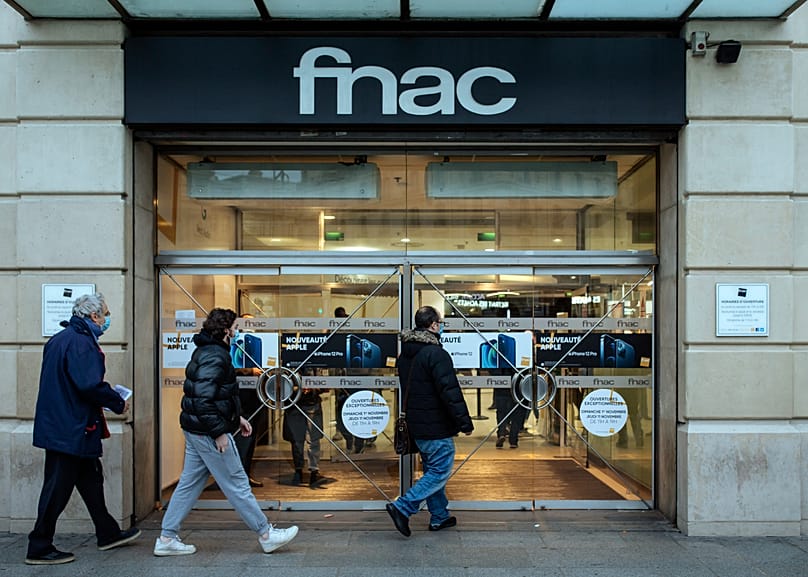Chinese e-commerce giant JD.com’s decision to take a stake in retailer Fnac Darty has revived French government concerns about China’s growing influence in Europe.
After Shein, Temu, and Alibaba, another major Chinese online retailer is making inroads into France: JD.com. The e-commerce heavyweight has set its sights on Fnac Darty, one of France’s best-known cultural and electronics retailers.
 ADVERTISEMENT
ADVERTISEMENT
 ADVERTISEMENT
ADVERTISEMENT
In late October, JD.com also launched its JoyBuy shopping platform in France and several other European markets, positioning itself to compete not only with other Chinese platforms but with Amazon, which still dominates online retail in the region.
Who is JD.com?
JD.com, known in China as Jingdong, was founded in Beijing in 1998 by entrepreneur Liu Qiangdong, also called Richard Liu. It began as a small physical shop before expanding online.
Today, it is one of China’s biggest e-commerce companies, generating nearly $160 billion (€138.36bn) in sales in 2024 and ranking as the country’s third-largest online retailer, behind Alibaba and Temu owner PDD Holdings.
Who will own Fnac Darty in 2025?
Czech billionaire Daniel Křetínský, through his firm Vesa Equity Investment, is currently the largest shareholder in Fnac Darty with around 28.3% of the company.
His position gives him significant influence over what happens next and he is effectively the main counterweight to JD.com’s arrival. Křetínský can either increase his stake to keep the retailer under European control, or use the Chinese interest as an opportunity to sell part of his holding and cash out.
The second-largest shareholder is Ceconomy AG, the German group behind MediaMarkt and Saturn, which owns about 22% of the capital. The rest of the company is split among various investment funds, smaller shareholders, employees and the group itself, with the remainder traded on the stock market.
This summer, JD.com launched a takeover bid for Ceconomy. If successful, the €2.2 billion deal would give JD.com indirect control of Ceconomy’s stake in Fnac Darty, strengthening its foothold in the European retail sector. The acquisition is currently being finalised in Germany.
Fnac Darty, best known for its electronics, books and household appliances, operates mainly in France but also has stores in Spain, Portugal, Belgium, Switzerland, Luxembourg and a number of African and Middle Eastern countries.
The Ministry of the Economy is on alert
The French Ministry of the Economy — known as Bercy — closely monitors all foreign investments in French companies and projects involving Chinese firms are subject to even tighter scrutiny.
The government is not only assessing the financial implications of such deals, it is also examining possible risks to France’s cultural sovereignty and its ability to maintain control over how cultural content is created, distributed, and curated.
This heightened vigilance reflects a broader government strategy that increasingly treats cultural industries as strategic assets, on a par with energy, defence, and other sensitive technologies.
According to sources familiar with the discussions, JD.com’s leadership has met officials at the Ministry to offer reassurances, stressing that the company intends to comply fully with French regulations and does not plan to increase its stake further. Economy Minister Roland Lescure recently confirmed that talks are ongoing.
JD.com has formally requested that Bercy review the deal. Under French investment-screening rules, the Ministry now has between one and three months to issue a decision.
A major concern in JD.com’s case is the possibility that data belonging to Fnac Darty’s roughly two million customers could, in certain circumstances, be accessed by China.
The issue centres on China’s National Intelligence Law, introduced in 2017 and expanded several times since, which obliges Chinese organisations and citizens to assist the country’s intelligence services and hand over information deemed relevant to national security.
In practice, this means that a Chinese parent company such as JD.com could, at least in theory, be required to share data held by its subsidiaries or business partners abroad — a scenario that alarms French officials.
Fnac Darty holds a significant amount of data on the cultural and technology habits of French and European consumers — information that could be highly valuable to any major digital player, and a source of concern for authorities focused on protecting France’s digital sovereignty.
The potential deal, which would make JD.com the second-largest shareholder in the retailer, raises a wider question that European governments are increasingly confronting: how far should China be allowed to expand its presence in the continent’s commercial and digital infrastructure — from warehouses and delivery networks to sensitive customer databases — without Europe losing control over sectors it considers strategic?













